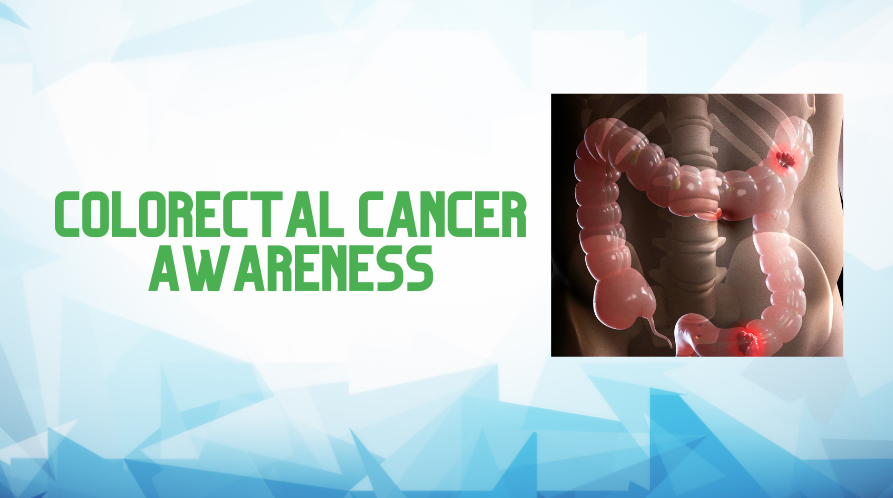Colorectal cancer, also known as bowel cancer, is cancer that starts in the colon or rectum. Colorectal
cancer is the third most common cancer in both men and women, and it is highly treatable when
caught early. Symptoms can include blood in the stool, changes in bowel habits, unexplained weight
loss, and abdominal pain.
Regular screenings, such as colonoscopies, can help detect colorectal cancer in its early stages when
treatment is most effective. It is recommended that adults begin regular screenings at age 50, or
earlier if they have certain risk factors such as a family history of the disease.
In addition to screenings, maintaining a healthy lifestyle can help reduce the risk of developing
colorectal cancer. This includes eating a diet high in fruits, vegetables, and whole grains, exercising
regularly, maintaining a healthy weight, and avoiding smoking and excessive alcohol consumption.
Let’s use Colorectal Cancer Awareness Month as an opportunity to educate ourselves and our loved
ones about this disease, and to encourage everyone to prioritize their health by getting regular
screenings and making healthy choices. Together, we can work towards reducing the impact of
colorectal cancer on our communities.
Causes:
– Age: Risk of developing colorectal cancer increases with age, with most cases occurring in people
over 50.
– Family history: People with a family history of colorectal cancer or polyps have an increased risk.
– Personal history of inflammatory bowel disease: Conditions such as Crohn’s disease or ulcerative
colitis can increase the risk.
– Genetics: Certain genetic conditions, such as Lynch syndrome, can increase the risk of colorectal
cancer.
Symptoms:
– Change in bowel habits
– Blood in the stool
– Abdominal discomfort or pain
– Unexplained weight loss
– Nausea or vomiting
– Fatigue
Treatment:
– Treatment for colorectal cancer may include surgery, chemotherapy, radiation therapy, targeted
therapy, or a combination of these.
– Surgery is the most common treatment for early-stage colorectal cancer and may involve removing
part or all of the colon or rectum.
– Chemotherapy and radiation therapy are often used before or after surgery to help shrink tumors or
kill any remaining cancer cells.
Prevention:
– Maintain a healthy weight
– Eat a diet high in fruits, vegetables, and whole grains
– Limit red and processed meats
– Exercise regularly
– Quit smoking
– Limit alcohol consumption
Home Remedies:
– Eating small, frequent meals
– Drinking plenty of fluids
– Avoiding spicy, fatty, or fried foods
– Taking over-the-counter pain relievers as directed
Lifestyle Changes:
– Regular exercise
– Healthy diet
– Avoiding tobacco and excess alcohol
– Regular screening for colorectal cancer
Medications:
– Medications may be used to help manage symptoms or side effects of treatment, such as pain,
nausea, or fatigue.
Support:
– Family support can be crucial during treatment and recovery, providing emotional support and
assistance with daily tasks.
– Employers should offer support to employees undergoing treatment, such as flexible work hours or
accommodations for physical limitations.
– Psychological support, such as therapy or support groups, can help patients cope with the
emotional impact of a cancer diagnosis.
Surgery:
– Surgery is a common treatment for colorectal cancer and may involve open surgery or minimally
invasive surgery, such as laparoscopy.
– After surgery, patients may need to take care to protect the incision site, avoid heavy lifting, and
follow a specific diet.
Chemotherapy and Radiotherapy:
– Chemotherapy and radiation therapy are commonly used in combination with surgery to treat
colorectal cancer, targeting any remaining cancer cells.
Recovery Time:
– Recovery time after surgery will vary depending on the type of surgery and individual factors.
– Patients may need physical therapy or rehabilitation to regain strength and mobility after
treatment.
Consulting a Doctor:
– It is important to consult a doctor if you experience any symptoms of colorectal cancer or if you
have a family history of the disease.
– Regular screenings, such as colonoscopies, are recommended for early detection of colorectal
cancer.
Recurrence:
– The risk of colorectal cancer recurrence varies depending on the stage of the cancer and the
effectiveness of treatment.
– Regular follow-up appointments and screenings are important to monitor for any signs of
recurrence.
In conclusion, it is important to raise awareness about colorectal cancer during the month of March
and educate ourselves about its causes, symptoms, treatment options, prevention methods, and
ways to support those affected by the disease. From family support to workplace accommodations,
surgery options to recovery aids, psychological support to positive thinking, there are numerous
resources available to assist in every step of the journey from diagnosis to recovery. By staying
informed, seeking medical guidance when needed, and maintaining a positive attitude, we can work
towards better outcomes and reduced chances of recurrence. Together, we can make a difference in
the fight against colorectal cancer.
To know more:
https://youtu.be/hHpkAMAjIUs
https://youtu.be/ZcBFS_Q_iRA
https://youtu.be/jIsYo8fzMqU
Comments are closed.








